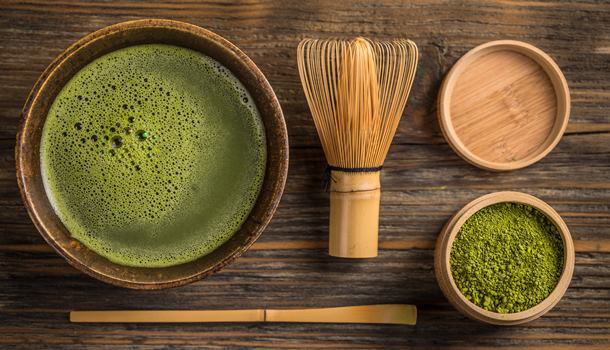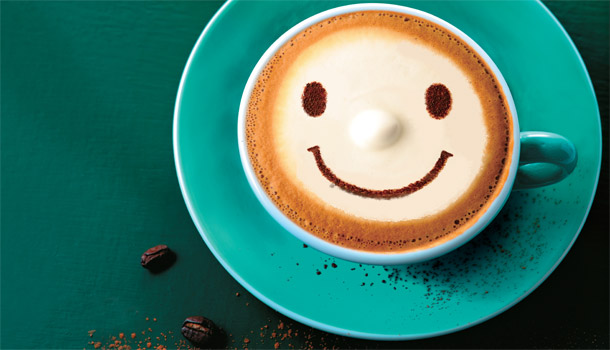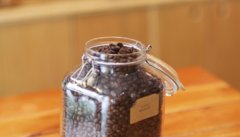Is matcha latte equal to green tea? As a matcha controller, you must understand

For professional baristas, please follow the coffee workshop (Wechat official account cafe_style)
Are you a matcha fan? Do you know whether green tea is the same as matcha? The Food and Drug Administration of the Ministry of Weifu has given the answer that the raw materials of matcha powder and green tea powder are both "green tea", but the production process is slightly different. Qiu Chuifeng, deputy director of the tea improvement farm of the Council of Agriculture, said after an interview with the media that as far as he knows, Taiwan does not have the technology to produce matcha. "if the matcha products sold in Taiwan are made in Taiwan, they are probably green tea."
What is the difference between matcha and ordinary green tea? What matters should be paid attention to when choosing matcha? Here are a few questions to answer common matcha questions.
Q1: matcha is just grinding green tea into powder?
A: the tea leaves that make matcha will be specially selected. Only spring tea will be used, with better aroma and less bitter substances. Xu Weiting, an assistant professor in the Department of Natural Biotechnology at Nanhua University, who specializes in tea research, further explains that the tea used to make matcha will also be covered for a period of time before picking, reducing sun exposure and making bitter substances less easy to produce. As a result, the tea that makes matcha is slightly sweet compared with ordinary green tea.
In the way of production, matcha, like green tea, is steamed after picking. However, matcha is not kneaded after steaming, but the tea is dried and the veins are removed, leaving only the part of the leaves and crushed into powder with stone mortar.
Q2: is it true that matcha is more nutritious than green tea?
A: it's true. Matcha powder is ground from a whole piece of tea, and it will be more complete than other kinds of tea in terms of nutrition intake.
Tutiya, a nutritionist in the Nutrition Therapy Department of Zhenxing Hospital, pointed out that if compared with the same Japanese tea, every 100 grams of matcha has 29.6 grams of protein, which is higher than 24.5 grams of fried tea. Matcha contains 420 milligrams of calcium, which is higher than 390 milligrams of jade dew. In terms of iron, matcha has 17 milligrams per 100 grams, which is also more than 10 grams of jade dew.
In addition, compared with tea soup that only drinks tea, matcha is characterized by the complete nutrition of tea. Xu Weiting says that fat-soluble vitamins A, D, E, and K can all be released in matcha; in addition, antioxidant ingredients such as catechins and tea polyphenols will contain more than green tea because they are ground and brewed whole pieces of tea.
Other studies have pointed out that matcha contains a lot of dietary fiber, which is about 52.8 times that of spinach and 28.4 times that of celery.

Q3: drink tea worried about pesticides, matcha also have pesticide concerns?
A: if pesticides are detected in tea, matcha will consume more agricultural medicine. Xu Weiting explained that under the condition of perfect management of the tea garden, green tea and matcha do not have to worry about pesticide residues. However, in the event of excessive pesticides in tea, matcha is brewed with whole pieces of ground powder to drink, while brewing tea is just drinking tea soup, so there will be more pesticides than tea when drinking matcha.
Q4: can't you sleep when you drink matcha?
A: actually, the caffeine content of matcha is not low. The type of tea, growing environment, baking degree, production process. Will affect the content of caffeine. Xu Weiting said that matcha uses young tea leaves, and with less light, there will be more caffeine in matcha than other teas.
On the other hand, matcha grinds the whole piece of tea into powder, and caffeine is released more than ordinary tea. According to the Japanese Food Standard composition Table, the author of "drinking three cups of coffee a day will be healthy" said that 100 grams of matcha contains more than three times as much caffeine as black tea and even higher than coffee.
Q5: how to tell if it is a natural, unadded matcha?
A: in terms of aroma, sediment and color. Xu Weiting said that in the regular Japanese tea ceremony, matcha does not add other ingredients except the ground tea powder, but the matcha handbags and instant bags in the market are not necessarily, because matcha does not have much flavor, only the aroma of tea. there may be manufacturers who mix milk powder or sugar with milk powder or sugar in order to make the taste and taste better.
He also warned that matcha should be dilute after brewing, and because matcha powder is an insoluble substance, the powder will precipitate after a long time. If you feel thick after brewing, and the powder and water blend evenly, it is suspected that dextrin has been added.
Xu Weiting also stressed that attention should be paid to the appearance of color when buying matcha. Natural matcha is not very bright in color. He said that if the color of matcha is too bright or too dark, it may be caused by pigment.
Q6: what is the best match for matcha?
A: matcha is the best partner only with red beans. Because matcha has not been baked, it completely retains the cold nature of the tea itself, so it is not suitable for people who are prone to stomach discomfort or cold hands and feet. Traditional Chinese medicine suggests that adding a pinch of red beans to matcha can reduce the coolness of matcha itself and is less likely to cause stomach scraping.
And many girls' favorite matcha latte, analysis shows that each 100cc of ordinary matcha, green tea calorie at most 22 calories, but added sugar and milk matcha latte, but up to 10 times the calories of the former.
Chao Chiang, a dietitian at Mackay Memorial Hospital in Taipei, also mentioned in "Kangjian" that matcha itself is still a little bitter, and people often add more sugar, cream, cream, or flavors to enhance the taste. People think that drinking tea is to maintain good health, but the result is that the more you drink, the fatter you get.
If you want to eat the nutrition of matcha, you might as well have a bowl of Yuzhi (matcha) Jinshi (red beans)!
Important Notice :
前街咖啡 FrontStreet Coffee has moved to new addredd:
FrontStreet Coffee Address: 315,Donghua East Road,GuangZhou
Tel:020 38364473
- Prev

People love and hate coffee, so drink it!
Is coffee a health killer? Professional barista exchanges, please pay attention to coffee workshop (Weixin Official Accounts cafe_style) drinking coffee has its own health effects, excessive intake of coffee will cause many adverse effects on the body, such as: difficult to sleep, stomach injury, increased cholesterol, easy to block iron absorption, and increased risk of osteoporosis. But if drunk properly,
- Next

Coffee classroom | learn how to protect coffee beans from oxidation and smell at once.
Communication of professional baristas Please pay attention to the coffee workshop (Wechat official account cafe_style) to buy and preserve coffee beans, and to preserve ingredients, there is not much difference. If you want to drink fresh and delicious coffee, it depends on what coffee beans you buy and how to preserve them. As soon as the coffee beans are roasted, their freshness is greatly reduced and they begin to deteriorate. Especially after grinding, the aroma begins to decrease.
Related
- Beginners will see the "Coffee pull flower" guide!
- What is the difference between ice blog purified milk and ordinary milk coffee?
- Why is the Philippines the largest producer of crops in Liberia?
- For coffee extraction, should the fine powder be retained?
- How does extracted espresso fill pressed powder? How much strength does it take to press the powder?
- How to make jasmine cold extract coffee? Is the jasmine + latte good?
- Will this little toy really make the coffee taste better? How does Lily Drip affect coffee extraction?
- Will the action of slapping the filter cup also affect coffee extraction?
- What's the difference between powder-to-water ratio and powder-to-liquid ratio?
- What is the Ethiopian local species? What does it have to do with Heirloom native species?

